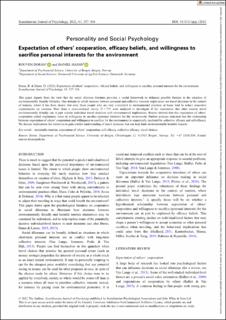Expectation of others' cooperation, efficacy beliefs, and willingness to sacrifice personal interests for the environment
Journal article, Peer reviewed
Published version

Åpne
Permanent lenke
https://hdl.handle.net/11250/3054336Utgivelsesdato
2022Metadata
Vis full innførselSamlinger
Sammendrag
This paper departs from the view that the social dilemma literature provides a useful framework to delineate possible barriers to the adoption of environmentally friendly lifestyles. One domain in which tensions between personal and collective interests might occur are travel decisions in the context of tourism, where it has been shown that even those people who are very committed to environmental practices at home tend to reduce respective commitments on vacation. Data from a cross-sectional survey N = 771 were analyzed to investigate if the expectation that other tourists travel environmentally friendly can in part explain individual travel decisions with environmental implications. Results showed that this expectation of others' cooperation added explanatory value in willingness to sacrifice (personal interests) for the environment. Further analyses indicated that the relationship between expectation of others' cooperation and willingness to sacrifice for the environment is sequentially mediated by collective efficacy and self-efficacy. We discuss implications for initiatives to gain a better understanding of travel decisions that can help limit environmentally harmful impacts.
